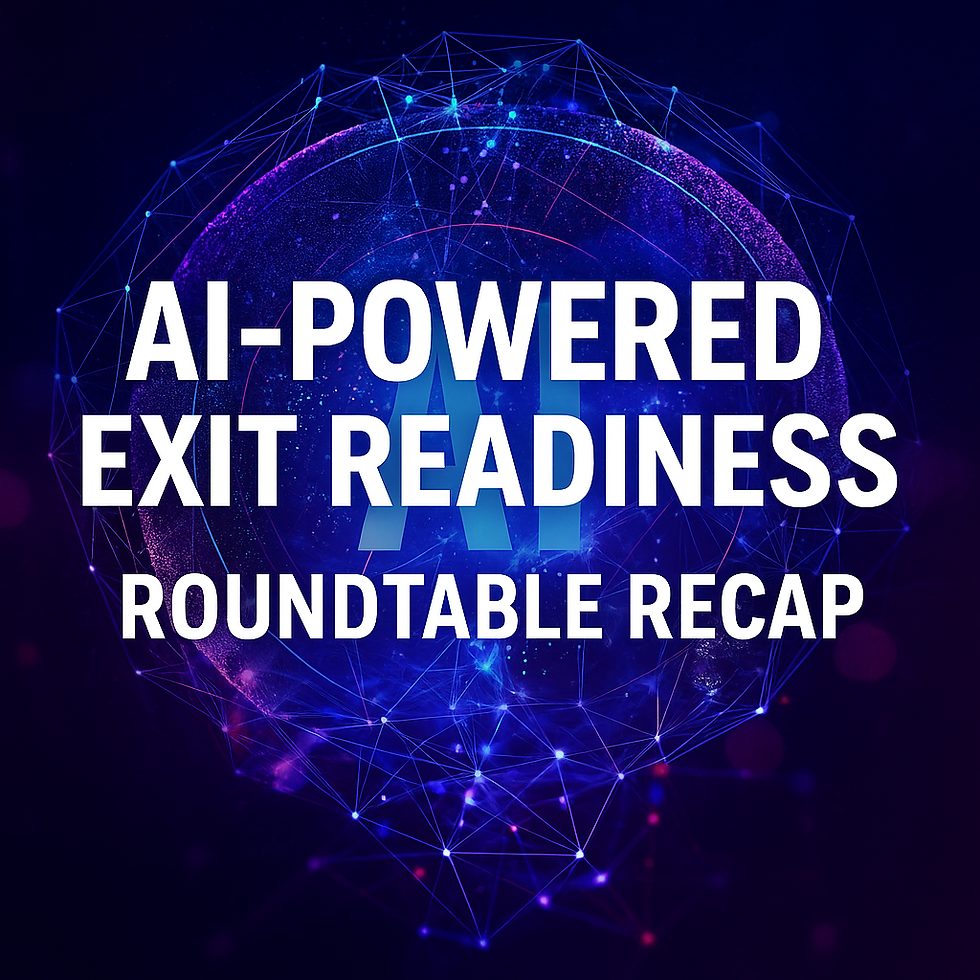PL3 Virtual Roundtable Recap – Second Bite or Bitter Pill? Navigating the Human Risk in Rollover Equity & Earn-Outs
- William Gladhart
- Sep 3, 2025
- 3 min read
Updated: Sep 4, 2025
Roundtable Date: August 20, 2025
August's discussion underscored a hard truth: the biggest risks in M&A aren’t financial - they’re human. Most dealmakers see earn-outs and rollover equity as elegant tools to bridge valuation gaps and keep founders invested in a company’s future. But as our panel reminded us in this month’s PL3 Virtual Roundtable, these same structures often plant the seeds of mistrust, misalignment, and litigation - sometimes before the ink is even dry.
Key Takeaways
Rollover equity aligns interests, but earn-outs are fragile bridges that frequently spark disputes.
Defining terms, reporting standards, and roles upfront is critical to preserving trust.
Cultural and market differences (U.S. vs. Europe) shape how these structures succeed or fail.
Founders must prepare early, both financially and personally, for life after exit.
The headline number matters less than clarity, trust, and alignment from day one.
The Hidden Risk Beneath the Spreadsheets
Bob Dunn (GF Data) kicked off with a clear distinction: rollover equity aligns interests for the next exit, while earn-outs are mostly valuation bridges. But while common, they are far from risk-free. Nearly half of earn-outs, he noted, end up in dispute or litigation, underscoring just how fragile these structures can be if expectations aren’t set upfront.
Lindsay Guzowski (The Crucible) added first-hand perspective as both a buyer and a seller. In her words, “earn-outs are speculative by nature.” Even with good intentions, shifts in accounting methods, new layers of management, or misaligned incentives can dramatically alter outcomes. Her takeaway? Without clarity and trust at the start, what looks like upside quickly turns into conflict.
U.S. vs Europe: A Tale of Two Markets
Alex Ingrisano highlighted the cultural and structural differences between the U.S. and European deal markets. American founders often view rollover equity as a chance to “make money twice,” selling earlier in their careers and staying engaged for future upside. In contrast, many European founders wait until much later in life to exit and rely more heavily on earn-outs - creating a different set of tensions around valuation and control.
Aligning Roles, Reporting & Retention
Will Lindstrom (The Culture Think Tank) emphasized that too many founders wait until the last year before a sale to “clean up” financials. This late shift creates disputes when reporting systems change post-close.
He also flagged a deeper issue: founder identity. With 76% of founders regretting their sale within 18 months, buyers must structure not only clear KPIs but also realistic roles that respect both sides of the transition.
Lindsay stressed the same point from the retention angle: buyers should define incentives, reporting, and succession plans with precision. Surprises in cost calculations or unclear authority lines quickly erode goodwill, even when both sides share the same end goals.
Where Deals Go Right and Wrong
The panel shared real-world outcomes. Successful rollovers preserved alignment and built wealth for sellers who stayed engaged. Failed earn-outs, on the other hand, often stemmed from vague definitions or unexpected post-sale changes that halved expected payouts and soured relationships.
Looking Ahead
All agreed the next 3–5 years will bring change. With many founders nearing retirement, rollover equity percentages may decline as sellers seek cleaner, faster exits. At the same time, PE funds and advisors may reframe these tools as part of a broader wealth strategy rather than just deal mechanics.
Panelists
Lindsay Guzowski – CEO, The Crucible
Alex Ingrisano – Co-Founder & Managing Partner, Avantgard Group
Cynthia Kyriazis – Moderator, Chief Experience Officer, The Culture Think Tank
Watch the full replay here - https://youtu.be/-ufG87dE61k?si=Jf4qTW4vCfYxef7O
If you found this Roundtable of value, join us on Thu 09.25 1:30P CST for another RT Session on how AI is impacting financial reporting & EBITDA in pre-due diligence: https://us02web.zoom.us/webinar/register/9717551952374/WN_NX8rOcBaSpisu_95E5haUA
If you missed any of our Virtual Roundtable sessions or want to revisit the conversation, you can access any of the replays on the PL3 YouTube Channel.
Will Gladhart is the Chief Marketing Officer at The Culture Think Tank & PL3. His experience includes brand strategy & marketing, content creation, email marketing, and communication outreach.


